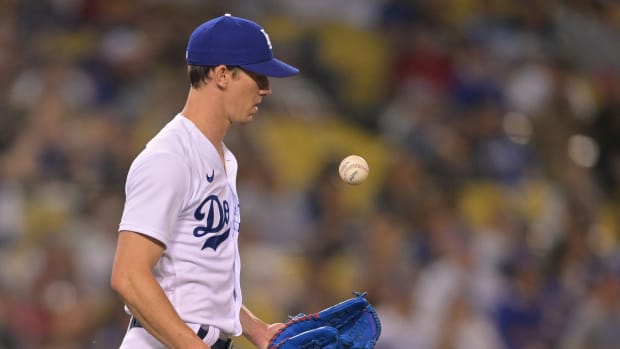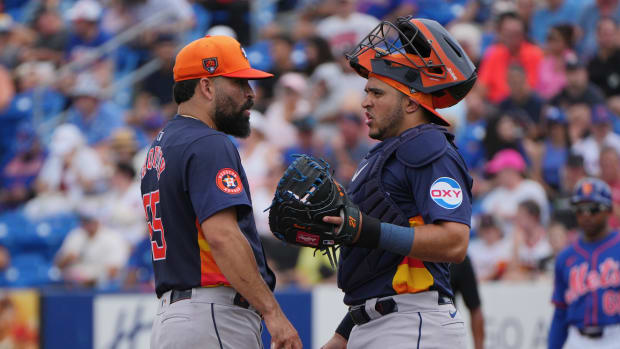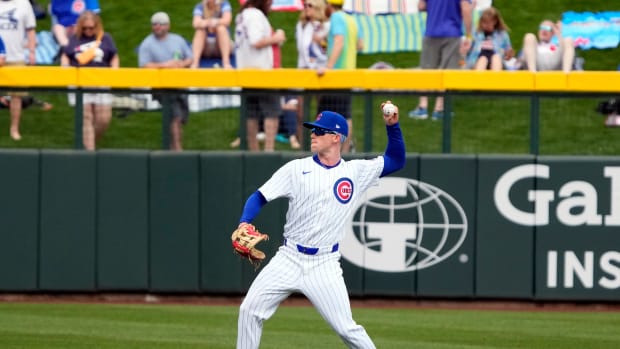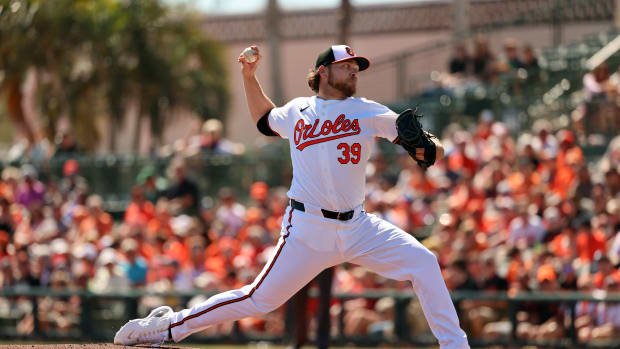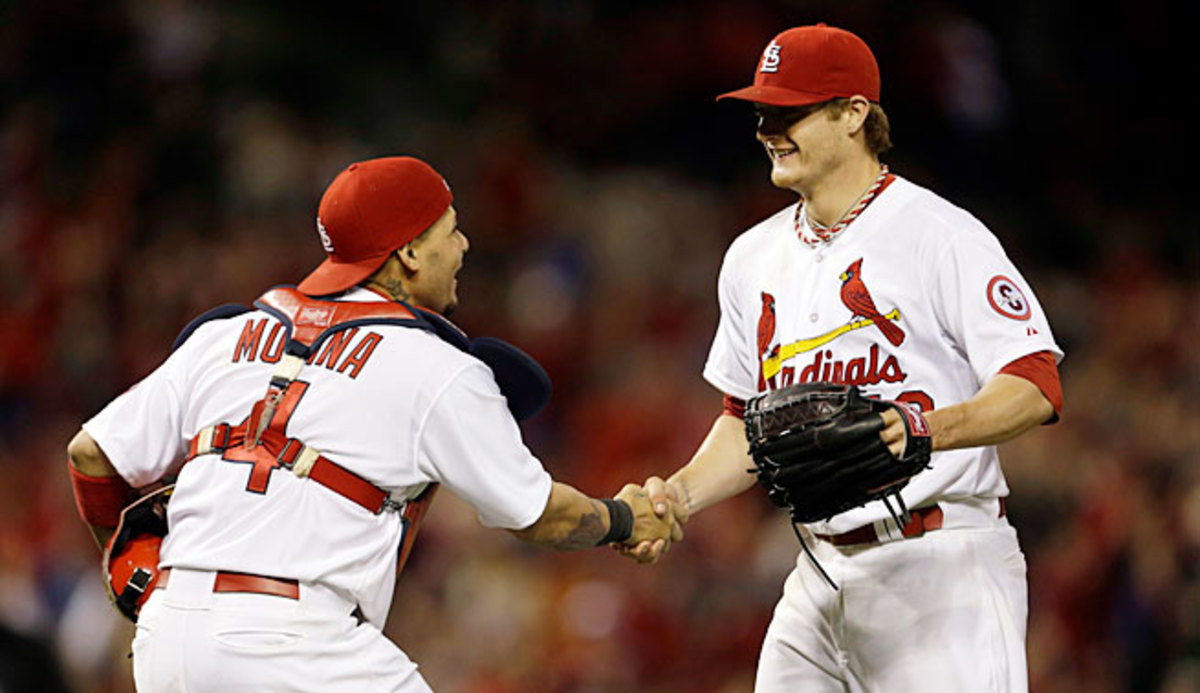
Yadier Molina is the real staff ace of the Cardinals

Cardinals rookie star Shelby Miller (right) says he credits all of his success to Molina.
Jeff Roberson/AP
To Yadier Molina's long list of accomplishments -- five Gold Gloves, four All-Star selections, two World Series championships -- we can add this: He is a fine actor. His specialty is playing dumb.
The nuances of being a catcher are among the most difficult to understand, and the statistical impact of the position remains among the most difficult to quantify, of virtually any in sports. Most lesser catchers -- and all of them are lesser catchers compared to the 30-year-old Cardinal -- embrace every opportunity to discuss the intricacies of their position. Molina does not.
"I've been told that if you keep the ball down, you're going to have close games," he says. "If you keep the ball up, you're going to allow more home runs. So I like pitchers who keep the ball down."
Anything else? "I'm not a pitching coach," he says. "I'm just trying to call a good game." Then he shrugs. The conversation is over.
Molina's ruse is betrayed by his pitchers and coaches, who are eager to take us behind the mask, to speak about his unique talent in a way that Molina himself is not. They talk about his physical gifts: his ability to frame and block pitches, his throwing arm (since 2005, he has gunned down 44.4% of would be base stealers, the best rate among catchers facing at least 100 runners). More than that, they talk about his analytical mind, how he can use his knowledge of hitters -- he can, they say, accurately recall precise pitch sequences from years ago -- and his understanding of his own pitchers' arsenals and abilities to produce the best possible outcomes.
"He would amaze me," says Dave Duncan, a former big league catcher who was one of the game's best pitching coaches between 1983 and 2011 with the White Sox, A's and Cardinals. "During the course of games, he would do something and I'd go, 'I can't believe he did that.' But it worked. His pitch calling, sometimes you're thinking he's doing something so out of the norm, yet it was the right thing to do at the time."
Molina's presence behind the plate has long been a boon to Cardinals' pitchers -- since 2005, the staff's ERA is 3.91, and 3.76 in innings caught by Molina himself -- but one subset to whom it has been particularly important is those making their first major league starts.
St. Louis' rotation, like any club's, has had its health issues. In the last calendar year, four Cardinals prospects have been called upon to make their big league starting debuts, and a fifth, the highly regarded 2012 first round pick Michael Wacha, will make his against the Royals on Thursday. The prospects have possessed a range of skill levels from phenom Shelby Miller to somewhat lesser talents like John Gast, Joe Kelly and Tyler Lyons, but each has had to deal with a set of obstacles familiar to any neophyte: nerves; the distraction of arranging for tickets and travel for friends and family who desire to support them; opposing lineups that are better than they have ever before faced, and with whom they are almost entirely unfamiliar.
CHEN: Wacha not only top prospect -- or Cardinal farmhand -- on fast track to majors
Recent first time Cardinals starters, though, have had an inordinate amount of success. In their starting debuts, Kelly, Miller, Gast and Lyons combined to throw 24 innings in which they allowed 23 hits and just six earned runs, for a cumulative ERA of 2.25. They had just one bad frame between them: the sixth of Gast's first outing, on May 14, in which he yielded four runs on three hits to the Mets, but only after he'd permitted no runs and three baserunners in the first five innings.
Several factors contribute to such stellar debuts: the pitchers' own talents; the way the organization's famously disciplined and coherent developmental system has groomed them; the fact that just as the pitchers are unfamiliar with big league hitters, they are unfamiliar to the hitters, too. But the callow Cardinals believe that a central source is their club's neck-tattooed Virgil in shinguards.
"Yadi knows everything about every single hitter, exactly what to throw," says the 22-year-old Miller, who, at 5-3 with a 2.02 ERA and 9.4 strikeouts per innings, has emerged as the NL's leading Rookie of the Year candidate. "If you execute your pitches and throw them where he wants the ball, you're going to get hitters out, have a better ERA, win the game. I seriously believe that all the success I've had is totally on him." (While Miller, alone among the recently-debuted quartet, did not make his first start with Molina behind the plate -- he threw to backup Tony Cruz -- he says that Molina's game-planning and influence played a major role in his six shutout innings last Oct. 3: "Tony obviously gets to be around Yadi every single day, learns from him, calls great games when he gets opportunities to.")
CORCORAN: Miller dominating deep class of NL rookies
Veteran Cardinals, like staff ace Adam Wainwright, describe how Molina's technique and ability can calm them, and give them an advantage even if they haven't delivered a given pitch exactly to his specifications. "His gloves are old, and they're so worked in that when you throw to him, it sounds like you're hitting a pillow," Wainwright says. "It's also how soft he catches the ball. He's never stabbing at it. He can make a pitch that's borderline, knee down, look like a perfect strike. A ball off the plate looks like it split the corner. And he also has such a good feel as to what you're working with that day, what you need to do to get outs that day. When he's suggesting something, you should usually listen to it."
Molina's older brothers, Bengie and Jose, have similar mental and technical gifts (Bengie, 38, played 13 seasons, between 1998 and 2010; Jose, 37, is currently in his 14th season, his second with the Rays), but they have always lacked the athleticism that has made Yadier not just an elite catcher, but also an elite player. The elder Molinas are famously slowfooted, having combined for just 19 career steals, a figure that Yadier has already more than doubled. And while neither of them ever had an OPS better than .785, Yadier's has surpassed .814 in three straight seasons. This year, he is batting .355, with three home runs, 27 RBIs and an .875 OPS, 14th-best in the National League.
Molina's all-around ability has come to be recognized league-wide in the last several years, as he has received MVP votes after three of the last four seasons, finishing fourth in 2012. To the Cardinals, though, his output while standing next to the plate is decidedly secondary to his wizardry while squatting behind it, which has allowed them to run out an ever-changing starting rotation, and simply to keep winning.
Michael Wacha, who is 21 years old, stands 6-foot-6 and throws a fastball that can reach the upper-90s to go with a breaking ball that he has come to command well. If he is not quite the prospect that Shelby Miller was -- Miller was ranked No. 6 among Baseball America's Top 100 this year, Wacha No. 76 -- he is more highly touted than Gast, Kelly or Lyons ever were. Still, as he prepares to make his first ever major league start, he will encounter the same potential hurdles as his predecessors -- nerves, distractions, unfamiliarity -- and he would be wise to remember one thing: If he throws whatever pitch Yadi tells him to, wherever Yadi tells him to throw it, he will likely be just fine.






























